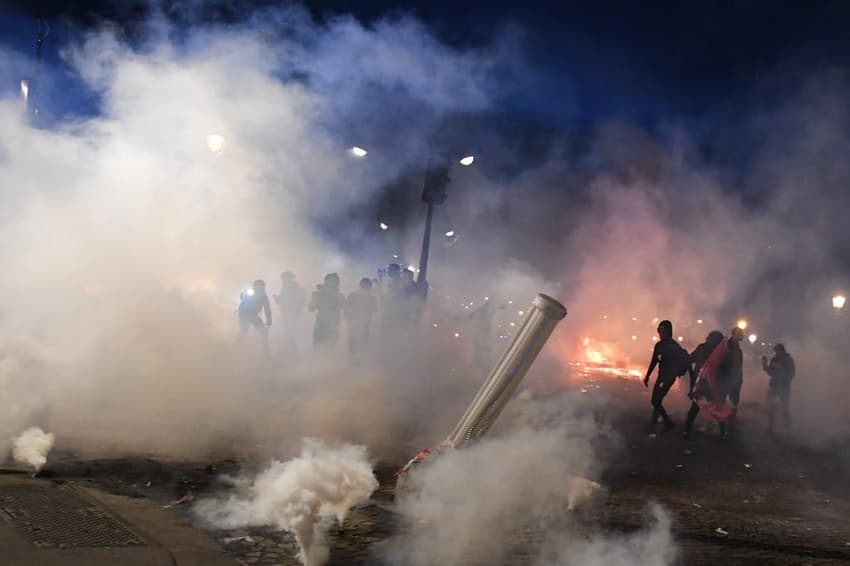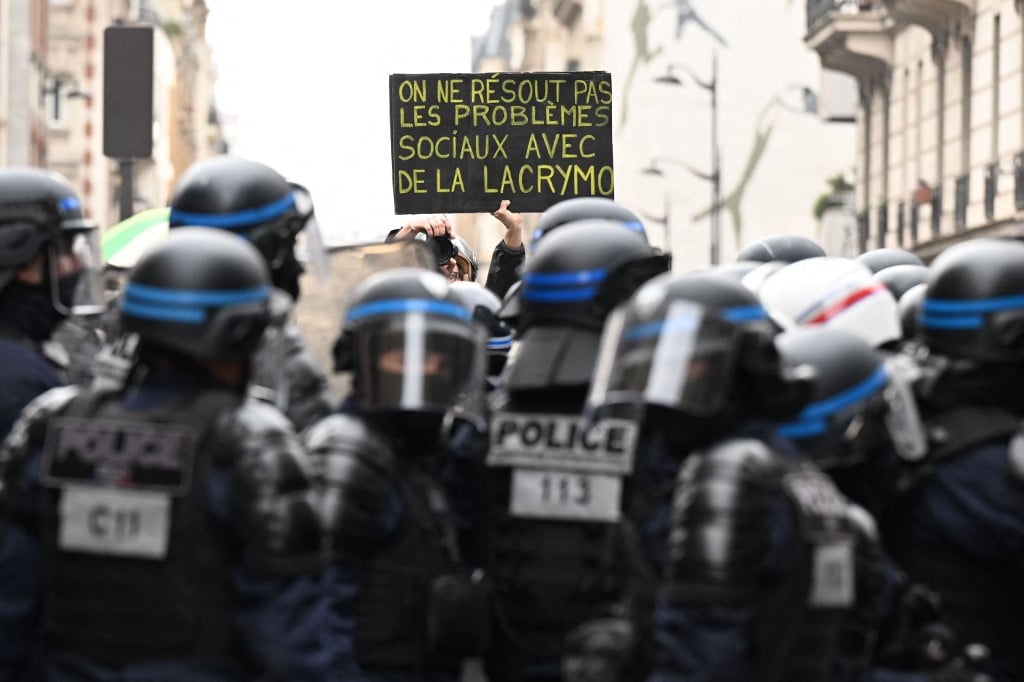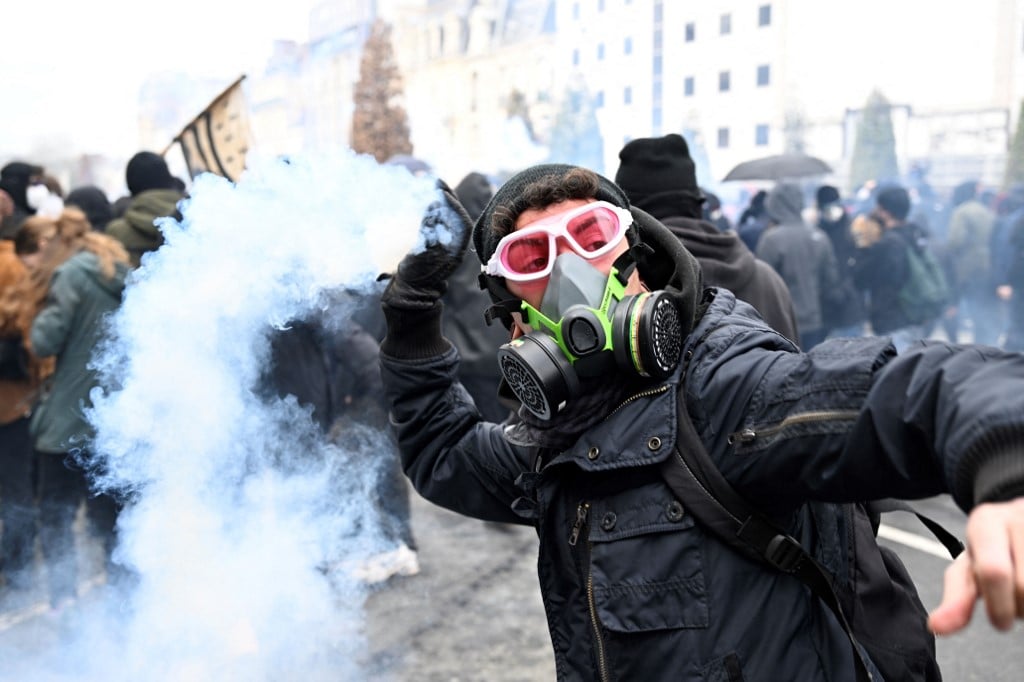EXPLAINED: Why do French police love to use tear gas so much?

Along with freshly-baked baguettes and cigarette smoke, there is another smell that is common in French cities - the horrible, choking reek of tear gas. So why do French police use this so liberally?
If you're reading media reports about French demos, it probably won't be long before you come across the phrase le gaz lacrymogène (tear gas). Likewise if you're walking down a French street near to where a protest is happening, it's not uncommon to suddenly smell the reek of the gas - and if you're really unlucky you might even be caught in a cloud of the choking chemical.
Tear gas is not a French invention of course, it's part of the armoury of non-lethal weapons for police forces around the globe - but it does seem to be particularly common in France.
How often do police spray tear gas?
According to French penal code, any police officer "responsible for public security or any other judicial police officer wearing the insignia of their position" is allowed to use force to disperse a gathering after two failed attempts of asking the crowd to disperse.
However, officers can use force, including tear gas, without first asking the crowd to disperse in cases of "direct force or violence against police" or if the territory the police are defending has been "invaded" - in those circumstances using tear gas is the decision of the individual officer.
READ ALSO When are French police permitted to use tear gas?
French police do not publish data on their use of tear gas, so it's not possible to say whether they use it more than officers in other countries, but anecdotal evidence and reports from voluntary organisations suggest that it is frequently used at demonstrations.
Amnesty International, in a report on the abusive use of tear gas, identified several instances in France that "do not comply with the requirements of international law and represent a threat to the right to demonstrate."

A protester holds a placard up to police, reading "Not all social problems can be resolved with tear gas" Photo by Emmanuel DUNAND / AFP
Frequent protests
Part of the reason for frequent use of the gas is the frequency of protests - France is a country where protest and general discontent goes quickly to the street.
Even outside of times of particular political tension, there are protests and demos most weekends in the big French cities, on subjects both domestic and international - for example on International Women's Day or declaring solidarity with the people of Ukraine.
At present France is in the grip of major discontent over the government's planned pension reforms, which have seen 10 nationwide protests called by unions, with up to 1.2 million people taking part in demos across France on a single day. In addition to these big demos, recent days have seen smaller spontaneous gatherings in response the the latest developments in parliament.
Most demos are entirely peaceful and the vast majority of people who protest do so in a law-abiding manner.
However demos often attract a small, violent fringe - known as casseurs (hooligans) - or the more organised trouble-makers of the Black Bloc. They commonly smash shop windows and bus stops, set fire to street furniture and bins and generally try to cause havoc.

Violence goes both ways - a protester in Rennes (who has come prepared with a gas mask) throws a tear has grenade back at police. Photo by DAMIEN MEYER / AFP
Police response
Policing demos is a big part of the job of the French police and there is a special unit of police known as the CRS (Compagnies républicaines de sécurité) which is concerned with crowd-control and riot policing, although local police units also get involved in big demos.
Among the weapons at their disposal are tear gas, water cannons, guns that fire rubber bullets and 'flash ball' grenades. These last two are particularly controversial and were responsible for some terrible injuries during the 'yellow vest' protests, when demonstrators lost hands or feet to the grenades, while several people were partially blinded after getting a rubber bullet in the eye.
Policing tactics of course vary, but it's common for police use tear gas first to try and disperse crowds, before moving on to other options.
Officers are frequently criticised for being 'trigger happy' with tear gas, using it before even trying other, non-violent, tactics to disperse a crowd.
During the chaotic scenes at the Champions League football final at the Stade de France in 2022, footage of police spraying tear gas into the faces of Liverpool fans caused shock in the UK. Although plenty in France also condemned policing of the match, there was less shock at the use of tear gas in such a situation, as many French people would not have been surprised at the police behaviour.
Shortly after the Champions League final, another video went viral in France - this time of police using tear gas on people who were queuing for a replacement bus service at Gare de l'Est when trains were cancelled during a storm.
Situation chaotique à la Gare de l’Est.
Gaz lacrymogène utilisé sur des voyageurs qui tentent de monter dans des bus de remplacement suite à une panne.
« On veut des bus pas des flics » pic.twitter.com/fLvE69Glgx
— Clément Lanot (@ClementLanot) June 4, 2022
It should be pointed out, however, that violence on demos goes both way and hooligans often attack police officers - hundreds of officers were injured during the 'yellow vest' protests and throwing rocks, bottles and paving slabs at police is a common tactic of the small, violent minority.
Police violence
There is a growing conversation in France about police violence, and it usually involves two things; the policing of demos and the behaviour of French police towards people of colour and inhabitants of France's poorest suburbs, who frequently report disproportionate rates of police stops and ID checks and violence from officers.
When it comes to demos, criticism has grown in recent days about the police response, especially in Paris, to days of small-scale demos and vandalism where protesters frequently set fire to piles or rubbish or wheelie bins and then move on.
Protesters and opposition politicians have complained of mass arrests and 'preventative arrests' of people who had committed no crime - allegations that Paris police chief Laurent Nunez strongly denied in a TV interview on Wednesday.
However, criticism has been aimed at police within France for years, even decades, over police demo tactics.
How the 'yellow vests' forced France to have a conversation about police violence
French police have also been criticised by international organisations including Amnesty International and Human Rights Watch for their public order policing techniques, especially over use of non-lethal weapons such as flash grenades and rubber bullets.
Despite that, little has changed.
Comments
See Also
If you're reading media reports about French demos, it probably won't be long before you come across the phrase le gaz lacrymogène (tear gas). Likewise if you're walking down a French street near to where a protest is happening, it's not uncommon to suddenly smell the reek of the gas - and if you're really unlucky you might even be caught in a cloud of the choking chemical.
Tear gas is not a French invention of course, it's part of the armoury of non-lethal weapons for police forces around the globe - but it does seem to be particularly common in France.
How often do police spray tear gas?
According to French penal code, any police officer "responsible for public security or any other judicial police officer wearing the insignia of their position" is allowed to use force to disperse a gathering after two failed attempts of asking the crowd to disperse.
However, officers can use force, including tear gas, without first asking the crowd to disperse in cases of "direct force or violence against police" or if the territory the police are defending has been "invaded" - in those circumstances using tear gas is the decision of the individual officer.
READ ALSO When are French police permitted to use tear gas?
French police do not publish data on their use of tear gas, so it's not possible to say whether they use it more than officers in other countries, but anecdotal evidence and reports from voluntary organisations suggest that it is frequently used at demonstrations.
Amnesty International, in a report on the abusive use of tear gas, identified several instances in France that "do not comply with the requirements of international law and represent a threat to the right to demonstrate."

Frequent protests
Part of the reason for frequent use of the gas is the frequency of protests - France is a country where protest and general discontent goes quickly to the street.
Even outside of times of particular political tension, there are protests and demos most weekends in the big French cities, on subjects both domestic and international - for example on International Women's Day or declaring solidarity with the people of Ukraine.
At present France is in the grip of major discontent over the government's planned pension reforms, which have seen 10 nationwide protests called by unions, with up to 1.2 million people taking part in demos across France on a single day. In addition to these big demos, recent days have seen smaller spontaneous gatherings in response the the latest developments in parliament.
Most demos are entirely peaceful and the vast majority of people who protest do so in a law-abiding manner.
However demos often attract a small, violent fringe - known as casseurs (hooligans) - or the more organised trouble-makers of the Black Bloc. They commonly smash shop windows and bus stops, set fire to street furniture and bins and generally try to cause havoc.

Police response
Policing demos is a big part of the job of the French police and there is a special unit of police known as the CRS (Compagnies républicaines de sécurité) which is concerned with crowd-control and riot policing, although local police units also get involved in big demos.
Among the weapons at their disposal are tear gas, water cannons, guns that fire rubber bullets and 'flash ball' grenades. These last two are particularly controversial and were responsible for some terrible injuries during the 'yellow vest' protests, when demonstrators lost hands or feet to the grenades, while several people were partially blinded after getting a rubber bullet in the eye.
Policing tactics of course vary, but it's common for police use tear gas first to try and disperse crowds, before moving on to other options.
Officers are frequently criticised for being 'trigger happy' with tear gas, using it before even trying other, non-violent, tactics to disperse a crowd.
During the chaotic scenes at the Champions League football final at the Stade de France in 2022, footage of police spraying tear gas into the faces of Liverpool fans caused shock in the UK. Although plenty in France also condemned policing of the match, there was less shock at the use of tear gas in such a situation, as many French people would not have been surprised at the police behaviour.
Shortly after the Champions League final, another video went viral in France - this time of police using tear gas on people who were queuing for a replacement bus service at Gare de l'Est when trains were cancelled during a storm.
Situation chaotique à la Gare de l’Est.
— Clément Lanot (@ClementLanot) June 4, 2022
Gaz lacrymogène utilisé sur des voyageurs qui tentent de monter dans des bus de remplacement suite à une panne.
« On veut des bus pas des flics » pic.twitter.com/fLvE69Glgx
It should be pointed out, however, that violence on demos goes both way and hooligans often attack police officers - hundreds of officers were injured during the 'yellow vest' protests and throwing rocks, bottles and paving slabs at police is a common tactic of the small, violent minority.
Police violence
There is a growing conversation in France about police violence, and it usually involves two things; the policing of demos and the behaviour of French police towards people of colour and inhabitants of France's poorest suburbs, who frequently report disproportionate rates of police stops and ID checks and violence from officers.
When it comes to demos, criticism has grown in recent days about the police response, especially in Paris, to days of small-scale demos and vandalism where protesters frequently set fire to piles or rubbish or wheelie bins and then move on.
Protesters and opposition politicians have complained of mass arrests and 'preventative arrests' of people who had committed no crime - allegations that Paris police chief Laurent Nunez strongly denied in a TV interview on Wednesday.
However, criticism has been aimed at police within France for years, even decades, over police demo tactics.
How the 'yellow vests' forced France to have a conversation about police violence
French police have also been criticised by international organisations including Amnesty International and Human Rights Watch for their public order policing techniques, especially over use of non-lethal weapons such as flash grenades and rubber bullets.
Despite that, little has changed.
Join the conversation in our comments section below. Share your own views and experience and if you have a question or suggestion for our journalists then email us at [email protected].
Please keep comments civil, constructive and on topic – and make sure to read our terms of use before getting involved.
Please log in here to leave a comment.